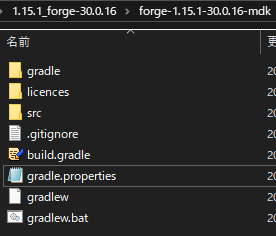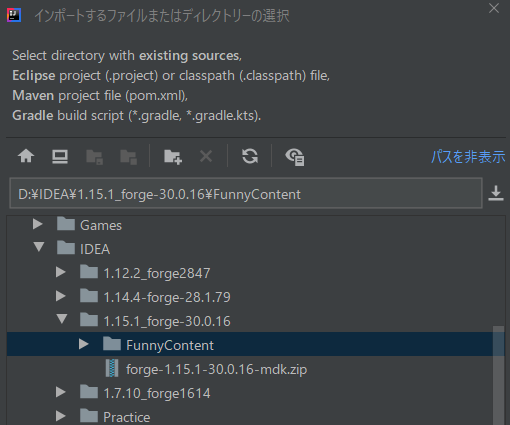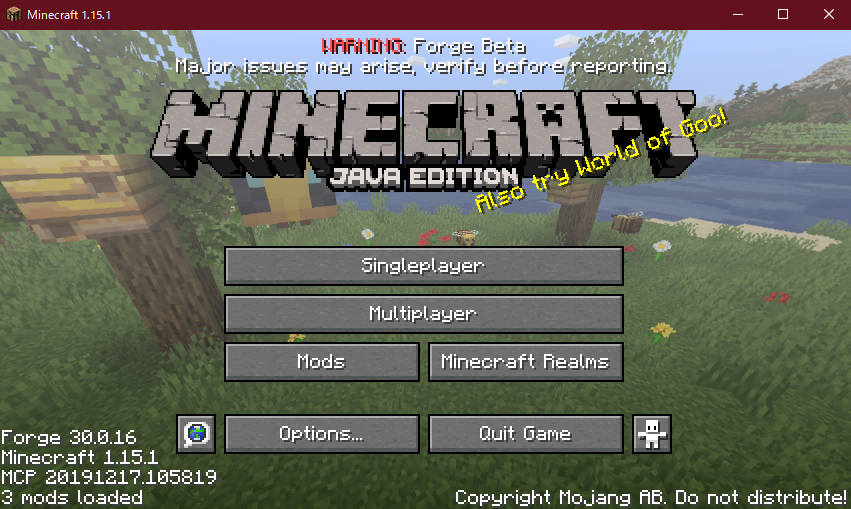[JAVA] Try modding with Minecraft Forge 1.15.1 ① [Building development environment] [Multiple versions supported] [IntelliJ IDEA]
Introduction
Recently, vanilla is updated frequently, and there are many changes in specifications, but Building an environment isn't that difficult as it's not much different than before. Forge of 1.15 has very few explanations, and stable operation is not guaranteed in beta version yet, so please take your own risk.
Most of the content in this article is ** common to many versions and environments. ** The difference is that the command to hit is different depending on the IDE and version.
For the time being, this article is mainly 1.15.1, so I will start with the explanation.
Development environment
- Windows 10
- JDK 8u161
- Minecraft 1.15.1
- Minecraft Forge 1.15.1-30.0.16
- IntelliJ IDEA 2019.2.4
Let's install the JDK
Download the JDK from here. You need to log in to the Oracle profile, so let's create one. Installation is successful if you install the downloaded file according to the procedure and finish.
Since we are using IntelliJ IDEA this time, there is no need to set environment variables.
Download Minecraft Forge MDK
An MDK is like a pack that Forge has prepared for you with the files you need for modding. This is mandatory when modding with Forge. Please select and download any version from here.
If you unzip the downloaded one, it will look like this.
The licenses are summarized in licenses, but there is no problem if you delete them.

Access this folder with a command prompt etc. and execute gradlew genintellijruns.
Wait for a while as the necessary files will be downloaded.
If * BUILD SUCCESSFUL * is displayed, it is successful.

Create a project with IntelliJ IDEA
Open IntelliJ IDEA, select ** Import Project ** and open the folder you just set up.

Select ** Create project from existing source ** ** Next **

Change to any setting ** Next **
- If you set the folder name to any mod name in advance, IDEA will automatically enter this name as well.

After this, it will appear several times in a similar window, but all are fine with the next. Finally, press ** Done ** to create the project.
When you see a window like this in the bottom right, press ** Import Gradle Project **.

Then the work will be done automatically, so let's wait until it finishes. It didn't take long because I've run it once in the test, but the first time it will take a few minutes so be patient.
If * CONFIGURE SUCCESSFUL * is displayed, it is successful.

This completes the development environment!
Let's start Minecraft
From the * Gradle * menu, run * FunnyContent *> * Tasks *> * fg_runs *> ** runClient **.
- If you want to debug the server, select * runServer *.

 Shaki-n
Shaki-n
Talk about being able to go with multiple versions
As a premise, I have developed with 1.7.10, 1.12.2, 1.14.4 + a (1.12.1 or ...). The detailed specifications of the version in the meantime are not known exactly, so don't be afraid. JDK In the first place, the JDK setup is not Minecraft, but ** Java development environment **. So, up to this point, the procedure is possible for all versions.
Command to hit
gradlew is a command to call the wrapper type Gradle included in Forge. Common to all versions.
Back in 1.7.x, you could hit setupDevWorkspace`` setupDecompWorkspace to get the setup you need.
Example: gradlew setupDecompWorkspace setupDevWorkspace eclipse
Since Eclipse was still the mainstream in this era, I was able to download the file for Eclipse by adding ʻeclipse` at the end.
The genintellijruns used in this article probably exists in the second half of 1.7.10, when IntelliJ IDEA became a major player. However, in 1.12.2, in my case, I just changed the last ʻeclipse to ʻidea to the same command as in 1.7.x so that it can be used in IDEA.
As mentioned above, if you change the command, even if the latest version comes and there is no explanation, I think that you can handle it by yourself to some extent.
At the end
There seems to be a way to use the IDEA plug-in, but I think this method, which is similar to the procedure as before, is the most reliable. It seems that obfuscation maps will be distributed from 1.15, and I feel that the specifications of Forge will change, but I would like to relax.
Recommended Posts